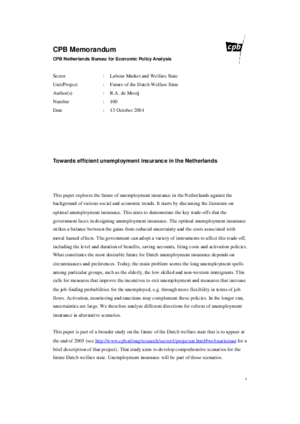Towards efficient unemployment insurance in the Netherlands
This aims to demonstrate the key trade-offs that the government faces in designing unemployment insurance. The optimal unemployment insurance strikes a balance between the gains from reduced uncertainty and the costs associated with moral hazard effects. The government can adopt a variety of instruments to affect this trade-off, including the level and duration of benefits, saving accounts, firing costs and activation policies. What constitutes the most desirable future for Dutch unemployment insurance depends on circumstances and preferences. Today, the main problem seems the long unemployment spells among particular groups, such as the elderly, the low skilled and non-western immigrants. This calls for measures that improve the incentives to exit unemployment and measures that increase the job-finding probabilities for the unemployed, e.g. through more flexibility in terms of job flows. Activation, monitoring and sanctions may complement these policies. In the longer run, uncertainties are large. We therefore analyze different directions for reform of unemployment insurance in alternative scenarios.
